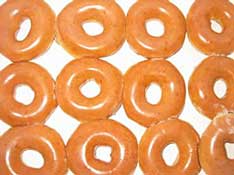Beware Trans Fats: Soon to be Labeled

PSA Rising, September 25 , 2003. You've probably heard by now: avoid trans fatty acids. Not so easy , for trans fats are in most processed food.
Trans fats are in fried foods, margerines and baked goods. Until now they've been hidden under the words "hydrogenated" or "partially hydrogenated" for fat ingredients listed on labels of packaged cakes, cookies, pie crusts and donuts. In restaurant foods and coffee shop pies and donuts you never "see" them at all. Even "healthy" low-fat muffins and cerals may contain reduced quantities of trans fats. Trouble is, trans fats are bad for us even in tiny quantities.
"The problem with trans fatty acids is that your body doesn't know what to do with them," said Brian Olshansky, M.D., University of Iowa Health Care professor of internal medicine. "Trans fatty acids may help preserve food so that it tastes good, but your body can't break them down and use them correctly," Olshansky said. "Normal fats are very supple and pliable, but the trans fatty acid is a stiff fat that can build up in the body and create havoc."
Trans fats can affect the lining of your blood vessels and brain surfaces, where the build-up can cause dysfunction. Trans fatty acids are linked to obesity, heart disease, diabetes, high cholesterol and even sudden cardiac death.
Prostate cancer is not on this list.So, is this one food worry that men who are primarily concerned about prostate cancer can shrug off? Not really. Mark Moyad, a University of Michigan specialist in nurtrution for men with prostate cancer prostate cancer says PCa patients should follow advice for a healthy heart. Hormonal suppression for prostate cancer may elevate cardiovascular risk. Researchers in London, UK report that loss of androgens in men leads to stiffer arteries and elevated insulin level.
We know heart disease is the number one cause of death. Mark Moyad at University of Michigan says: "The number one or number two cause of death in prostate cancer patients is also cardiovascular disease." Keeping this in mind, Moyad says, does not "belittle the impact of prostate cancer," it helps men and their dictors to remember that "the ultimate goal of healthy lifestyle recommendations is to reduce the burden of both of these major causes of death, especially after definitive prostate therapy. Patients need to be encouraged to know their cholesterol levels and other cardiovascular markers including blood pressure, as well as being aware of their prostate-specific antigen values."
Hormonal suppression in men dealign with prostate cancer may elevate cardiovascular Risk. Researchers in London, UK report that loss of androgens in men leads to stiffer arteries and elevated insulin level.
Moyad says: "Patients should not smoke, they should reduce their intake of saturated and trans fats, increase their consumption of a diversity of fruit and vegetables, consume moderate quantities of dietary soy or flaxseed, increase their consumption of fish or fish oils and other omega-3 fatty acids, as well as maintaining a healthy weight, getting at least 30 min/day of physical activity, and lifting weights several times a week." What us good for the heart, he says, is " generally found to be healthy for the prostate."Eating Plastic
The "chemical recipe" for a trans fatty acid, Dr. Orlanskey explain, involves putting hydrogen atoms in the "wrong place. It's like making a plastic." And who wants to eat plastic?
Olshansky acknowledges that it is hard to avoid trans fatty acids in the typical American diet. You often see "partially hydrogenated" in ingredient labels of processed foods, and the higher up those words appear on the list, the more trans fatty acids contained in the product. Fast foods and cheaper foods tend to include these fats because they stabilize the ingredients.
In particular, Olshansky and his colleagues recommend avoiding margarine with partially hydrogenated oils. Instead, try the newer margarines that contain zero trans fats.
"I'm recommending to my patients not to eat products with trans fatty acids and to keep away from processed foods and fast foods until they improve," Olshansky said.
Go for what's fresh instead, he said, citing a study published in the Journal of the American Medical Association that showed eating fresh food can lower your cholesterol as much as taking a statin medication.
"Good" fats, used in moderation, are monounsaturated and polyunsatured fats. Monounsatured fats include olive, canola and peanut oils. They should be stored in a cool dark place to keep them from going rancid. You can also supplement your diet with omega-3 fatty acids found in fish, nuts and some grains.
New labeling for foods is expected in 2006, and total trans fats will then be listed. However, not all trans fatty acids, or trans fats, are the same. Some specialists hold that some of then are good, and the labeling will not distinguish between the "good" and "bad" trans fats. Olshansky says that one good trans fat is CLA (conjugated linolenic acid). CLA actually improves the immune system and reduces the risk of cancer, he says. Most of the reported evidence for anti-cancer benefits of CLA is about colon cancer.
Before making any changes to your diet or health routine, it's always is best to consult with your physician or other health care professional.
Curr Opin Urol. 2003 Mar;13(2):137-45. The use of complementary/preventive medicine to prevent prostate cancer recurrence/progression following definitive therapy: part I--lifestyle changes. Moyad MA. Department of Urology, University of Michigan Medical Center, 1500 East Medical Center Drive, Ann Arbor, MI
Clin Sci (Lond). 2003 Feb;104(2):195-201. Testosterone suppression in men with prostate cancer leads to an increase in arterial stiffness and hyperinsulinaemia. Dockery F, Bulpitt CJ, Agarwal S, Donaldson M, Rajkumar C. Section of Geriatric Medicine, Imperial College Faculty of Medicine, Hammersmith Hospital, London W12 0NN, UK.
![]()


